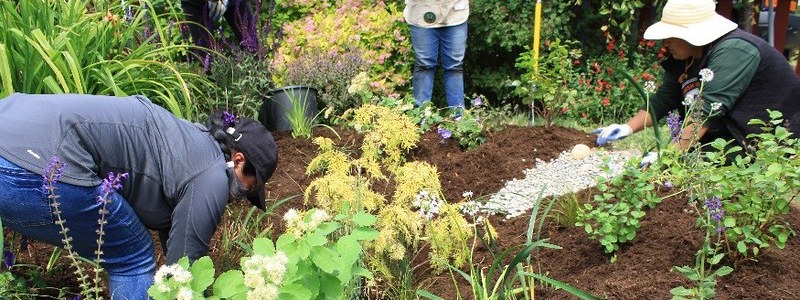For GSI managers

Learning together with the GSI community
We have been working with community partners for four years to bring green stormwater infrastructure (GSI) to life across unincorporated parts of the county. We’re committed to a partnership approach that puts residents at the helm, and we work to use every engagement as an opportunity to understand the property owner’s needs and vision for change, and to co-create a plan for how to get there.
We’re eager to collaborate with fellow GSI managers and thought leaders, and we look forward to connecting with more of you as we continue to learn from each other.
Connect with us
Are you a GSI manager? Enthusiastic about GSI? Both? Our team would love to talk with you. Email us with questions and comments or if you’d like to connect around an idea you have, or a recent lesson you learned.
Resources and lessons learned
Relationship continuity should be preserved as much as possible.
- Personnel turnover, particularly in the main point of contact, can be very disruptive to a project.
- Transitions may force some project aspects to “restart,” and it may take time for the GSI project partner to build trust in a new point of contact.
Be aware of when privately-owned businesses are viewed as important community gathering spaces, as these projects may gather a lot of interest and desire for engagement.
- Community support (or disapproval) can strongly influence whether a property owner is willing to move forward with a project.
- Harnessing the enthusiasm of neighbors and other community members will require extra and intentional time, resources, and communication.
- Taking the extra time upfront will save time later. Bringing together all parties that are interested in a project early on can help create an established communication route, and may bring important information and context to light.
GSI projects on properties owned by religious or spiritual organizations often require a unique approach and series of best practices.
- Religious organizations frequently have complex political and approval structures and dynamics. Because of this, it’s important to document all meetings and send all present a copy of the notes.
- Many churches plant dedication or honorary plants and trees. These will need to be marked to keep on the property during construction.
- Building trust and agreement is an important project component and may lengthen initial timelines. This may include presentations to and meetings with church councils and/or congregations.
- Project maintenance is often a huge concern for churches, and is mostly performed by volunteers. Having the church members be part of the planting plan and design will make it more successful since they will have ownership over the project and know how to maintain it long term.
- Churches have extensive attachments to the surrounding community that can be beneficial for teaching others about the program and stormwater in general. Churches present great partnership opportunities for education, outreach and community engagement.
 Translate
Translate